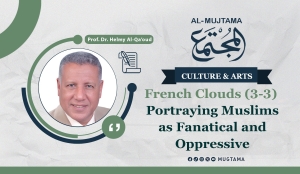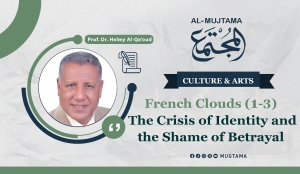French Clouds (3-3) Portraying Muslims as Fanatical and Oppressive
February 14, 2025Demonization of Muslims
And why does the fictional narrative insist on demonizing Muslims and portraying them as fanatical and oppressive while describing the Christian as a gentle beloved person steadfast in his faith no matter the torture he faces? Why did Umm al-Noor not save those who believe in her and see her with them during their torture and exposure to horrific injustices? Was "Shame on you, Christian" among the legislations of the conquering Islam? Or of the Muslim guests in Egypt, as described by Bishop Bishoy? Has the world ever heard that Muslims asked a Christian to announce his Islam to save his life? In what book or time? Does this Christian, who is forced to convert to Islam, add strength to the Muslims?
Islamic Teachings on Religious Freedom
The Holy Quran explicitly declares it. (Let there be no compulsion in religion, for the truth stands out clearly from falsehood.) (Al-Baqarah:256) Armed fanaticism with sick imagination is coming from the other side, and I believe that the general Egyptian public now hopes to enjoy some form of distinction in economics, politics, administration, and culture, similar to what the sect enjoys!
The question now is why do regime writers care to play the victimhood of the sect that has become distinguished and above the overwhelming majority? This is hinted at by some aspects of the novel 'French Clouds.
Thresholds and Endings
The cover of the novel features three primary colors: red, yellow, and blue, along with other mixed colors that almost resemble the color of the French flag. There is a large image of a face that is difficult to classify as either male or female. The title of the novel is written in a modern font closer to the Kufic style, with equal font size between the author's name and the title, as if expressing the author's self-confidence and strong presence; I would not go so far as to say narcissism.
There is another title for the novel in English, "French Clouds," and I am unsure of the significance of having a foreign title for a reader who is presumed to be Arab, considering that the language of the novel is Arabic. Does an affinity for belonging to a culture different from our Arab-Islamic culture represent a form of modernity and enlightenment, knowing that the author is supposed to have grown up within the Arab-Islamic culture, raised by her father who is described as an enlightened Azhar scholar?!
Cultural Affinity and Modernity
One's upbringing in a certain culture does not necessarily mean that they believe in it; every individual has their own free or directed choice. However, social conventions impose that there should be some level of compatibility and a basis from which to operate. The publisher of the novel is Dar Averroes ibn Rushd, and there are some intellectuals in the Arab world who see Ibn Rushd as a symbol of rationality and free thinking, which in their claims departs from the culture of imitation and closure that they believe governs Islamic thought.
This is a major falsehood propagated by some opponents of Islam and a handful of sectarians, in addition to opportunists who are not concerned with thought, reason, or beliefs, but rather with narrow personal interests. Ibn Rushd is a proponent of Islam who believes in revelation and does not consider it a mere historical product. He is a Muslim who performs his prayers and other forms of worship according to what revelation dictates.
Islamic Thought and Disagreement
The space for disagreement that Islam grants its believers is not unique to Ibn Rushd; many Muslim scholars and imams of different schools, as well as various sects and groups, have strived within the framework of revelation, sacred scriptures, and the noble hadith, doing what Ibn Rushd did and even more. However, it seems that some are attempting to secularize Ibn Rushd and detach him from Islam under the banners of modernity, enlightenment, and rationality.
Al-Ghazali and Ibn Rushd
A naive question comes to my mind: why do they adopt an antagonistic stance towards Imam Abu Hamid al-Ghazali, for example? Is it because he played a significant role in guiding Muslims to fight against the invading Crusaders in his time? Is it because he prepared his people through education and knowledge to face the tidal wave of Crusader barbarism that inundated Muslim lands? Is there anyone who can provide me with an answer? Ibn Rushd, the thinker of secularism or the publishing house of secularism, has a clear direction that adopts an intolerant stance towards Islam and revelation, and this is a choice available to its adherents, but they do not have the right to impose it on the Muslim community or its overwhelming majority.
Ibn Rushd's Beliefs And although Ibn Rushd was, in fact, a Muslim who believes in the universality of Islam and its suitability for all times and places, as well as in its fundamental beliefs, legislative principles, and the five pillars.
French Clouds (1-3) The Crisis of Identity and the Shame of Betrayal
February 13, 2025Novel Overview
"French Clouds" is a novel by the author Doaa Aasi.(1) The issue of identity is addressed through the celebration of the ideas of the Copts in Egypt, discussing the betrayal of teacher Yaaqoub and his followers during the French campaign in Egypt led by the butcher Napoleon Bonaparte (1798-1801), when they formed an army of Copts called the Coptic Legion and established a fortress in al-Rawai'i in Old Cairo. They fought against their Muslim brothers and killed them on behalf of the French invaders.
They did not limit their fighting to the capital; rather, they continued to battle alongside the French invaders deep into Upper Egypt. When the French campaign retreated, they withdrew with them and lived in France in the manner presented by the narrative, from a satirical perspective on Islam and Muslims.
About the Author
The author is inclined towards the left and the West in general, due to her upbringing in the house of her father, the Azhar-educated communist Sheikh Mustafa Aasi (1931-2011), who was born in the village of Basat Karim al-Din, affiliated with the Sherbin Center in the Dakahlia Governorate. Although the man had an Azhar education and worked in a religious capacity as an imam and preacher in the Ministry of Endowment, he lived within the public and secret organizations of the Socialist Union, and under the protection of Egyptian communists who referred to him as the enlightened Sheikh (what connects Islam and enlightenment that rejects religion and believes solely in material experience?). In 1976, he participated with them in founding the "National Progressive Unionist Party," which politicians often refer to simply as "Toto," a party that is government-affiliated by all accounts. The party ended up with a regrettable fate, as many of its members who were deceived by its dazzling slogans dispersed.
At one point, their number reached three hundred thousand members, but now, at best estimates, only three thousand remain. Its leaders beautify and promote the decisions of the authorities in exchange for some crumbs thrown their way, such as appointments to fictional councils and bodies that hold no real value in the living reality, and the domination over the destinies of culture, education, and media! This is in exchange for rewards paid from the blood of the miserable poor people.
Membership and Education
Doaa Mustafa Aasi, (born in Mansoura in 1970) is a current member of the House of Representatives. It has been reported that she is the first Egyptian female writer to obtain full membership in the Russian Writers' Union. She was educated in Franciscan schools and later traveled to the Soviet Union to continue her university studies. It is said that she is proficient in English, Russian, French, and has some knowledge of Italian.
Academic Achievements
She has obtained several certificates, including a diploma in the Russian language from the Pushkin Institute at Moscow University, a bachelor's degree in Tourism and Hotels with a focus on English and French, a diploma in Art Criticism from the Higher Institute of Art Criticism at the Academy of Arts, a diploma in Folk Arts from the Higher Institute of Folk Arts at the Academy of Arts, and finally a diploma in Arab Christian Heritage from the Evangelical Theological Seminary.
Published Works
Doaa has published several books, including the novel "104 Cairo," the novel "Supermarket Happiness," and the novel "French Clouds," which addresses the traitor Jacob and his men, and received significant attention from the Russian side and the dominant Egyptian left in culture and its institutions in Egypt!




